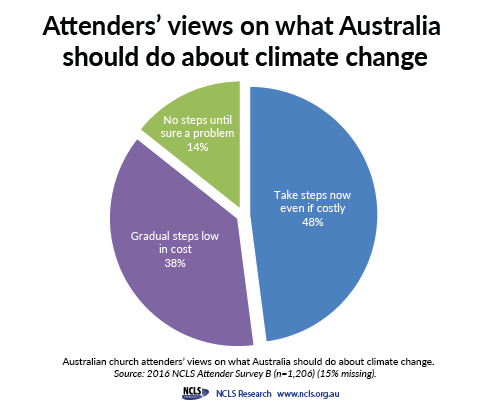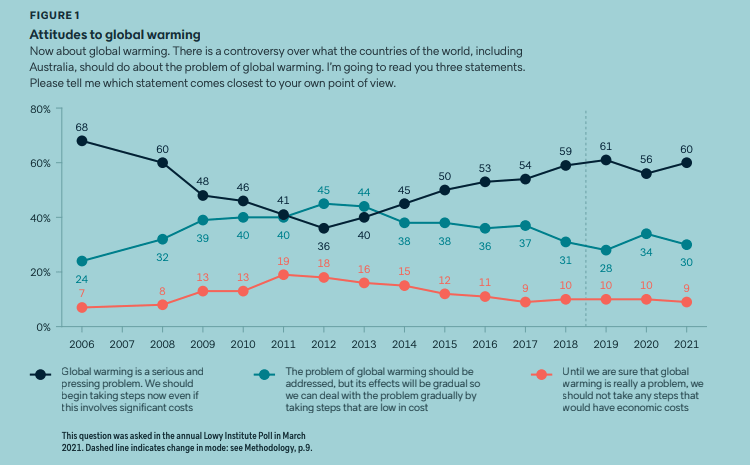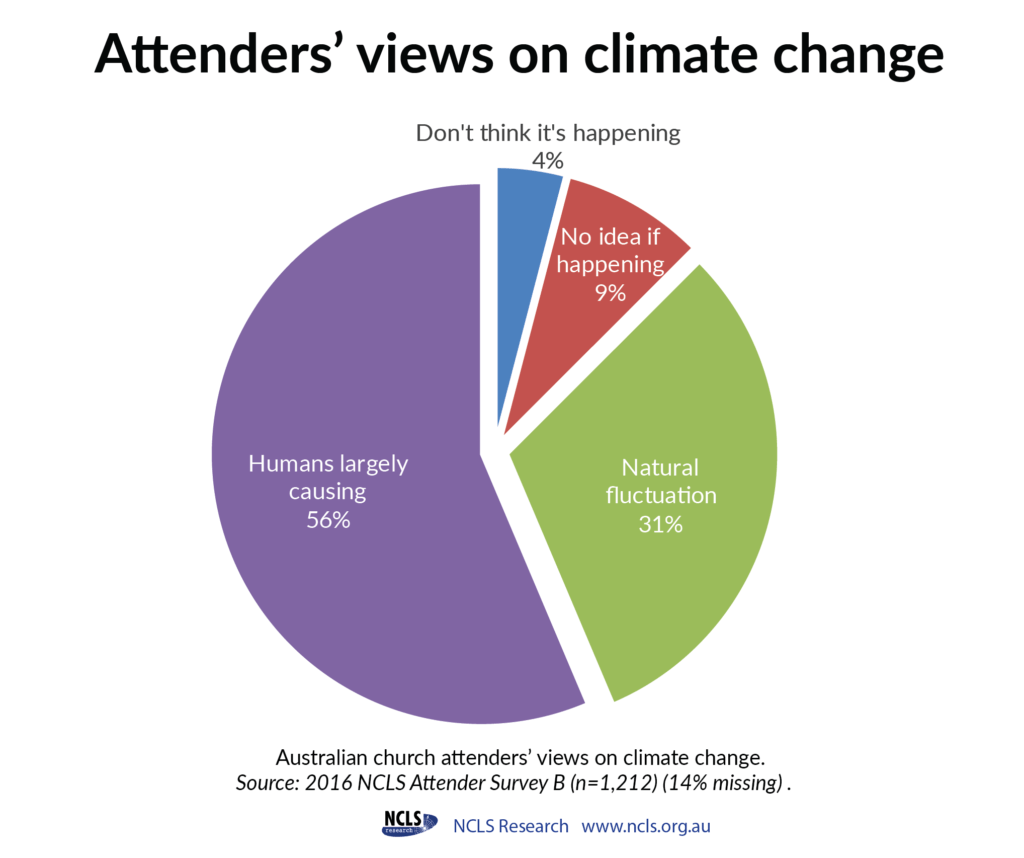The debate is over: Most Australian Christians support action on climate change – even if it's costly
In case you haven’t noticed, there has been a lot of news about climate change around lately. For many people, it has been a welcome focus on one of the most significant issues of our times. But for some, it has been a difficult reminder of the widening gap between them and their fellow Australians.
These are the 9-10 per cent of Australians who still want to debate either the existence of climate change, its causes, or the need for immediate action – especially if it is costly. But even among Australian church attendees, people who hold this view are a small fraction.
 Just as is the case in wider Australian society, Australian Christians overwhelmingly support action addressing climate change, according to the most recent comprehensive data from the 2016 National Church Life Survey (NCLS).
Just as is the case in wider Australian society, Australian Christians overwhelmingly support action addressing climate change, according to the most recent comprehensive data from the 2016 National Church Life Survey (NCLS).
Back in 2016, 48 per cent of church attendees told NCLS Research they believe Australia should “take steps now even if costly”. Another 38 per cent said Australia should “take gradual steps low in cost”. Only 14 per cent said Australia should take “no steps until sure it is a problem”.
2016 may be a fair few years ago now, but there is no evidence to indicate Australian Christians have become less supportive of our leaders taking costly action on climate change.
Survey data for wider Australian society shows that the percentage of Australians who favour taking costly action on climate change has increased for almost a decade. (See the Lowy Institute’s Climate Poll 2021, a nationally representative survey on attitudes to climate change, as one example).
Interestingly, Lowy’s climate polling over the years shows a dip in support for taking steps to address climate change “now, even if this involves high costs’ during 2020 (from 61 per cent to 56 per cent). The institute attributes this to the pandemic. Instead, more Australians selected “the problem of global warming should be addressed, but its effects will be gradual so we can deal with the problem gradually by taking steps that are low in cost” as the statement they agreed with most. This group rose by 6 per cent on the previous year.
In 2021, the attitudes of both those groups of Australians returned to approximate pre-pandemic levels (see graph below).
However, the small minority of Australians who still think taking climate change action is unwarranted or requires further debate has not changed.
In fact, the percentage of Australians who selected “Until we are sure that global warming is really a problem, we should not take any steps that would have economic costs” has remained at 9 or 10 per cent of Australians since 2017 – although it peaked at 19 per cent in 2011. In 2012, support for costly action was at its lowest (36 per cent), and support for low-cost, gradual action peaked (45 per cent).
When last surveyed by the NCLS, only about 4 per cent of church attendees denied that climate change exists at all; 56 per cent believed it is caused by humans, 31 per cent that it is a natural fluctuation, and 9 per cent “don’t know if it is happening”.

While Christians are used to being a minority, these Christians have found themselves not only disagreeing with their fellow citizens in secular society but also with their brothers and sisters in Christ – and on an issue as foundational as caring for God’s creation – for over a decade. Surely that must be an isolating experience, and increasingly so, as the gap between them and the rest of Australia has grown wider.
Now, with even the Coalition government committed to net-zero emissions by 2050, I can imagine these Australians feel like they have been left behind.
Even Lyle Shelton – one of Australian politics’ most conservative conservatives – does not align with this small group. Writing just a few weeks ago, Shelton said: “No one wants to destroy the climate or any other part of our environment. On this we are united. How we steward this planet so future generations can also prosper is the point of contention.”
Yet while not aligning himself with this 9 per cent, Shelton evidently shares their feeling of being left behind.
“… the debate is over, we are all supposed to move on,” Shelton wrote, lamenting the “air of inevitability” he feels about Australia taking bold climate action.
Even those who disagree with Shelton may find themselves feeling compassion for the Christian politician who senses the ground shifting beneath him with every passing year. Indeed, Shelton would not be the only one, with the Coalition having made a significant about-turn on climate change – a major campaign topic – in sentiment, if not in substance. A friend recently remarked that this group must feel like the Communists did the morning they woke up to find Russia had been attacked, and their duty was now to fight in WWII.
It must be challenging to want to keep debating a subject when the overwhelming majority have already looked at the evidence and reached a conclusion. And of course, there is more debate to come about exactly how to get to net zero. But for those Christians taken by surprise by the Coalition’s moves or by surveys showing the solid support Christians have for action on global warming, the time has come to take comfort in being citizens of heaven, while embracing action on earth.
Shelton’s problem seems to be more one of political strategy than a personal affront. Granted, constructing a political program as a Christian can be tricky. But, like many Christians in politics, Shelton has signed up to promote a political package deal to believers. The limitations of that strategy are more evident than ever when it comes to the issue of climate change. Conservative politics’ Christian package deal comes with the classic “Christian” issues: opposition to unlimited abortion, concern for religious freedom, funding for chaplaincy, support for Scripture in schools.
But trying to find a way to bundle opposition to action on climate change into a package deal of classic Christian issues is not the answer. Christians don’t want to decide something as crucial as stewardship of creation for political reasons. They don’t want to align with a “side” because they have previously done so or may again.
Political allegiances are not a top priority for the majority of Australian Christians. Their allegiance is to God, and they know him as Creator. And climate change is about caring for the Creator’s creation.
None of this makes Christians unique; it just makes them what campaigners call ‘values voters’. That is to say, Christians vote and support political policies according to their Christian values.
For most Christians, opposing action that addresses climate change is simply not in line with their values because it either requires them to reject the expertise of the majority of climate scientists or privilege contemporary Western economies above all else.
But you can’t ask Christians to care about what’s happening overseas – to support missionaries financially, take up a special offering when disasters take place, and pray fervently for the salvation of people in other nations – and then expect them to care more about Australia’s economy than the effects of climate change on fishing villages in Kiribati. If the impact of climate change hurts people, Christians are going to care.
If there are people being hurt by climate change, Christians are going to care.
Christians believe all human beings are created in the image of God (Genesis 1.27), have inherent value as a result, and deserve to be treated as such. When faced with the lower standards of living experienced by people in other countries and acutely aware of their blessings, Christians have a proven track record of giving their money and spending their time serving and praying in order to help. So to many Christians, any argument against climate action based solely on Australia’s economy is irrelevant. That is just not how Christians live.
“Let each of you look not only to his own interests, but also to the interests of others,” the Apostle Paul wrote to the church in Philippi (Philippians 2:4 ESV). How can Christians learn this as a memory verse and then ignore the welfare of our south pacific neighbours?
Similarly, you can’t ask Christians to cultivate humility – to cultivate a posture of “not think[ing] of yourself more highly than you ought” – and then assess their own knowledge to be superior to that of experts.
Over and over the Bible’s book of Proverbs notes how wisdom is found in a multitude of counsellors (Proverbs 11:14, 15:22, 24:6). Why would a Christian not apply this principle to the “counsel” of climate scientists whose consensus is that urgent climate action is needed? Sure, they may not all be Christians, but some are like Katherine Hayhoe, Mick Pope, Bill McKibben and the late John Houghton – all of whom agree with their peers.
Humility is a basic Christian value – one to aspire to, if not yet perfected. So for most Christians, dismissing the wisdom of climate scientists’ consensus is somewhat counter-cultural.
For most Christians, the debate really is over – as difficult as it may be for some to hear.
Another value is that of living with future generations in mind. Christian parents are encouraged to raise their children “in the ways of the Lord” (Proverbs 22:6). Christians often celebrate families whose Christian heritage extends through several generations. The Bible even describes grandchildren as an older man’s crown (Proverbs 17:6).
There is no sense that a Christian’s responsibility extends only so far as their own generation. So, again, it does not align with Christian values to expect Christians to ignore how their behaviour will affect future generations. Most Christians are willing to sacrifice and pay a significant cost so that future generations can flourish.
Moreover, if creation declares the glory of God (Psalm 19) and “God’s invisible attributes – namely, his eternal power and divine nature – is clearly perceived through creation” (Romans 1:20), the thought of creation being destroyed can be alarming.
Christians instinctively understand how someone might be moved to respond to God when faced with the beauty of a brightly coloured Great Barrier Reef. Of course creation will testify to God’s glory in that instance! And the beholder will have the opportunity to perceive God and respond in that moment. But what is the testimony of a reef bleached white by a warming ocean?
For most Christians, the desire to take action on climate change is a natural overflow of their faith in the Creator. And while a political package deal of anti-abortion+pro-religious-freedom+anti-climate-action might be easier for Christian politicians to strategise around or sell, most Christians aren’t and won’t buy it.
For most Christians, the debate really is over – as difficult as it may be for some to hear. They are ready to stand with their fellow humans and take the needed action to protect God’s creation. Many are already in position and doing so. Because the time for asking climate change questions has passed, and the time for taking action is now – no matter what side of politics you’re on.
Email This Story
Why not send this to a friend?



